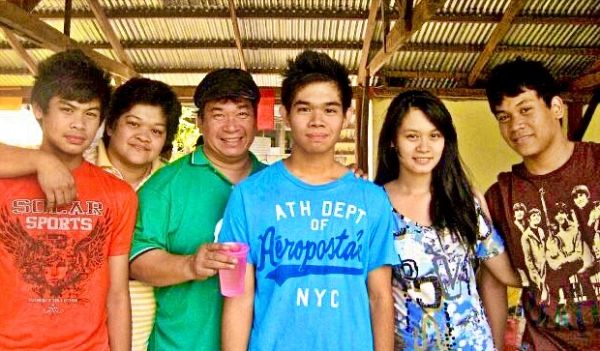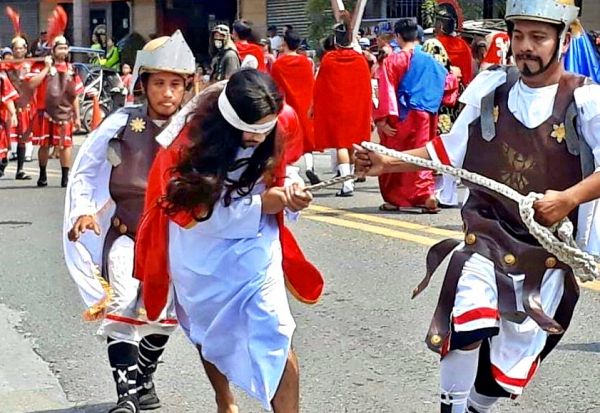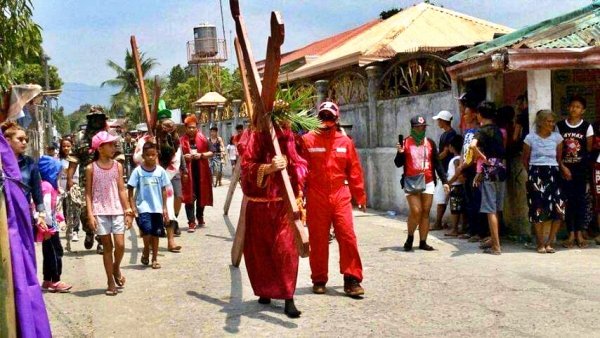Holy Week – one of the most important seasons in the Catholic Church, and now with the Corona virus and quarantine, concern overshadows people. Last year, one could not have imagined living this liturgical time any other way. In churches, statues of our Lord with his Mother along with other images are covered with purple cloth. Priests would be in the confession box until late hours. And people would be giving up chocolates or some other delights as penance.
Lent this year has presented unique challenges. But social media and digital technology helped me to keep up and appreciate the value of my faith. Quarantine has helped me see Lent in a different light but with the same lens: Christ.
I usually spend Holy Week in our hometown in Castillejos, Zambales. There I would witness townsfolk practicing corporal mortification with great fervor and honor. Penitensya is the word used in Tagalog. As a kid, I would ask my mother the same question each year on Maundy Thursday: "What are they doing?"

Some would practice self-flagellation. They would file in parade around several blocks of the town whipping their bare backs and bleed, while walking barefoot under the scorching sun. Others imitate Christ carrying the cross. They walk the streets tied to a rope and dragged by their friends (or so I think). They are beaten when they fall.
This can be terrifying. I never truly understood it. But trying to understand the what of the act cannot give the full picture. One must consider the why.
The concept of penance and reparation for sins committed has never been new to the people of Castillejos. They see it as their way to return to God; to begin again.
Many of the penitents visit seven churches in the course of their journey through the town. They pause whenever they see an image of Christ, pray a bit and then carry on. They end in front of the main Church (San Nicholas de Tolentino).
I remember an incident one year, as my brother and I were observing the end of the penitential practice. A bloodied penitent arrived at the front of the church. He suddenly knelt and dragged his way closer to the church entrance. He then fell face down, arms wide open and legs spread out. That prostration in front of the Church was an act of his submission to God.
What happened next stunned me. The man was sniveling. His face was covered, which is customary as they want to hide their identity. But I saw tears flowing out from the cloth. His head was trembling. He made me feel as if his intense cry of contrition was not for him alone, but for all of us around him.

Holy Week has never been the same for me again after witnessing that scene. Self-flagellation may not be the course of action God asks of me. But yes, acts of sincere penance and reconciliation.
Jesus taught us how to carry the cross. Carry it squarely on your shoulder, because your Cross, if you carry it like that, will not just be any cross… it will be the Holy Cross (J. Escriva, Holy Rosary, Fourth Sorrowful Mystery).
It is natural for the events that have marked the first quarter of this year to have saddened us, but considering things supernaturally will bring out their true light and meaning. As a friend of mine told me, "Our physical separation from [our] friends, inability to go to Mass, difficulties scheduling and making plans, even suspension of classes can bring out virtues in us.”
St. Rose of Lima seems to speak about our present condition when she writes: “No one would complain about his cross or about troubles that may happen to him, if he would come to know the scales on which they are weighed when they are distributed to men.” (St. Rose of Lima, Office of Readings, 23 August).
The inconveniences arising from being forced to stay home during these days, are an occasion for me to relate with the sufferings that Christ endured. I would like to see them as opportunities to become united with the sufferings of everyone affected by this pandemic.

I am spending these days of Lent in a student residence in Pasig (Philippines), finishing my requirements prior to graduation. From the Christian formation of my university years, I have come to understand that it is not so much the amount or the intensity of pain that gives suffering its supernatural value, but the penitential heart with which it is done.
St. Josemaria explains that penance can be lived in ordinary life: “Penance means being very charitable at all times towards those around you, starting with the members of your own family. It is to be full of tenderness and kindness towards the suffering, the sick and the infirm. It is to give patient answers to people who are boring and annoying. It means interrupting work or changing plans, when circumstances make this necessary, above all when the just and rightful needs of others are involved.”
During this quarantine period, short moments with Christ in prayer, petitioning him for the needs of others, little gestures of love towards those living with us at home, a simple "Thank you", bearing small and not so small trials with a smile, are the way we can live the big penitential themes of Lent.
